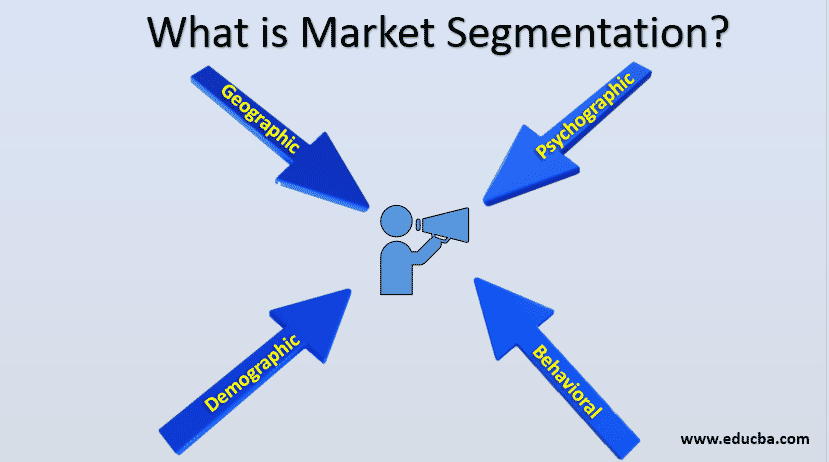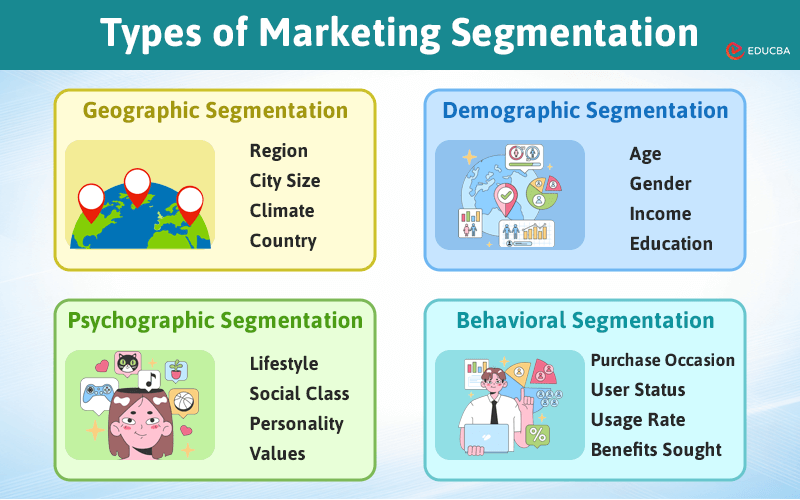
Introduction to Marketing Segmentation
Based on the characteristics of the customer in the market, the market has been segmented into 4 major categories. The Segmentation is made to target a group of the similar customer so that they can focus more on similar products based on customer satisfaction. The segment is basically for focusing the target audience for high sales.
Based on demand, requirements, and homogeneity, based on needs, the market divides these types of customers broadly into Segments, known as Market Segmentation. In order to achieve higher customer satisfaction, you will have to determine the type of customer. Hence it has been devised into 4 categories, which we will now understand deeper with a similar example.
Consider a merchandise shopping cart; you can see different categories placed in segments based on gender, which will be staked in a particular manner, so it is easy for the buyer based on their interests.
Top 4 Categories of Marketing Segmentation
Market segmentation is divided into geographic, demographic, psychographic, and behavioral categories.

Let us now have a look into these segments:
1. Geographic
Based on geography, the strategy of Segmenting the business is geographic Segmentation. This Segmentation is based on the customer’s interest in a particular product or service. The market can be geographically segmented by locality.
Here are a few important questions to answer in terms of Geographic Segmentation:
- Does the type of business profits in the locality?
- Are there any other competitors in the same area?
- How many age groups of people live in a particular locality?
- What age group is our target?
- Will that yield a good business?
Considering the geographical condition and knowing it is a remote area or is it easily available to every resident in the locality. Geographic Segments are also based on the country’s expansion of the market at international levels and cities, based on the class of the city.
Market Segmentation can also be segmented into rural, suburban, and urban. In this segment, the target audience matters a lot in placing their business and also the climate conditions. For example: If there is a heavy rainfall region, set up a raincoat, sweaters, jackets, and umbrellas stores. Whereas in a beach area, setting up swimwear will benefit. This strategy of classification is very basic for all business setups.
2. Demographic
Demographic refers to Segmentation based on age, gender, religion, nationality, monthly income, and age relativity.
Let us know the demographic segments in detail:
- Age/Age Relativity: The business is segmented based on the customer’s needs. If we take an example, the basic need of a baby of age group 0 to 2, the basic need is diapers and clothing. The age group of girls Between 15 to 25 are interested in fashionable hairstyles and clothing according to their age and sizes. Boys of the age group 5 to 18 indulged more in online gaming, and so on. Based on these factors, the business setup is decided.
- Gender: Gender matters a lot as to know which particular gender a business is targeting. Is it for males or females? This is one of the important factors in market research.
- Religion/Nationality: According to the region or the country, particular advertising needs to be done based on their language/religion/country. This is necessary for any business to convey customers to buy the product and to attract them.
- Income: The products or services set up in an area needs the income factor of people living in the same area calculated. For example, if the income of people in the area is low, setting up a luxurious spa service will not yield a good profit. Hence, it is very necessary to know the information regarding the income of the targeted section.
3. Psychographic
Based on psychological characteristics, the market Segmentation has been classified into 6 main groups. They are values, emotions, personalities, common beliefs, interests, and lifestyles. Considering these psychological factors, it is predicted that understanding customers’ needs and values will definitely satisfy the customer through their products or services.
The psychological survey is possible with market research and by statistically representing the sample of target values for a business. This is basically done by a Likert chart; this is a scale of measurement based on ratings from 1 to 5, with 1 strongly agreeing to 5 disagreeing. These ratings are represented in the form of charts and analyzed. By employing techniques in saving time, businesses can streamline this process, allowing quicker and more efficient identification of customer preferences and behavioral patterns.
4. Behavioural
The market has been segmented based on the behavior of the customer. Behavioral segmentation is done based on the needs of the customers, according to the common behavior. Keeping in mind a festival or occasional needs, usage, frequency, brand, and loyalty benefits, the behavior Segmentation is done. For example, if it is a Diwali festival, customers start seeking crackers, electric Diwali lamps, or indoor and outdoor lighting. Companies prefer repeated purchasing customers, hence introducing loyalty cards/benefits provided for customer attraction.
The present trend is customers’ online behavior, like it’s easy, convenient, and just a click away for home delivery. Not only the ease but also the online offers and posts, the customers are attracted to buying a product or any service. In the online section, the divisions are many in terms of food, apparel, footwear, grocery, and so on. Hence having an option online and offline has its own advantages and disadvantages.
Conclusion
The article gives insight into and overview of the various fields and factors involved in marketing Segmentation. The categories mentioned here help you understand and dig deeper into the lines. In general, the better you understand the market Segments, the better your business is run.
Recommended Articles
This is a guide to What is Marketing Segmentation? Here we discuss the top 4 marketing segmentation categories: geographic, demographic, psychographic, and behavioral. You may also look at the following articles to learn more –

